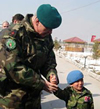Number 82 | December 8, 2009
Excerpts from Newsweek article, published December 7, 2009
Archibald Wavell himself could scarcely have imagined how horribly accurate his prediction would prove to be. Having watched in dismay as the victorious European powers carved up the Ottoman Empire after World War I—"the war to end war"—the British officer commented that they had instead created "a peace to end peace." And sure enough, the decades since have spawned a succession of colonial misrule, coups, revolutions, and an epidemic of jihadist violence. The U.S.-led invasion of Iraq in 2003 could be viewed as a last-ditch attempt by the world's sole remaining superpower to impose order on the region. Instead, the net result was to create a power vacuum, leaving Iraq too weak to counterbalance its neighbors and threatening to destabilize the whole map.
Turkey, the old seat of Ottoman power, did its best to stay out of that fight, refusing even to let U.S. forces cross Turkish soil for the 2003 invasion. Still, it's the Turks—not the Iranians, as many observers claim—who are now emerging as the war's real winners (…) Turkey's new standing in the region has a chance of transforming the country into something far more valuable to Washington than a subservient tool or proxy. The Turks say they're seeking to become what Turkish Foreign Minister Ahmet Davutoglu calls a "partner to solve the region's problems." (…)
Turkey's economy has more than doubled in the past decade, converting the nation from a backwater to a regional powerhouse. At the same time, its financial focus has moved closer to home: Turkey now conducts more trade with Russia, Iraq, and Iran than it does with the EU. Energy politics have also favored the Turks, who find themselves astride no fewer than three competing energy supply routes to Europe—from Russia, from the Caspian, and from Iran. Years of reform and stability are paying off as well. Ankara is on the verge of a historic deal with its Kurdish minority to end an insurgency that has left 35,000 dead in the past quarter century. In turn, Turkey is making peace with neighboring countries that once supported the insurgents, such as Syria, Iran, and Armenia. The principle is simple, says a senior Erdogan aide who's not authorized to speak on the record: "We can't be prosperous if we live in a poor neighborhood. We can't be secure if we live in a violent one."
The advantages keep compounding. Thanks to judicious diplomacy and expanding business ties throughout the region, Turkey is close to realizing what Davutoglu calls his "zero-problems-with-neighbors policy." The new stance has boosted Ankara's influence even further; the Turks have become the trouble-ridden region's mediators of choice, called in to help with disputes between the Palestinian factions Hamas and Fatah, between Iraq and Syria—even, before Erdogan's outburst in Davos, between Israel and Syria. Speaking at a recent press conference in Rome, Erdogan expressed little hope that Turkey could do more for Syria and Israel.
(…) [On Iran], the Turks believe they're wise not to play an antagonistic role, and officials in Ankara insist that Erdogan's warm words to Ahmadinejad are no more than atmospherics. At base, they say, Turkey shares the West's goals regarding Iran's nuclear ambitions; it's just doing things in its own way (…) When the International Atomic Energy Agency offered Iran the option of exporting most of its low-enriched uranium in return for French-made fuel rods in October, Erdogan offered Ahmadinejad a deal (apparently with Washington's blessing): Iran could store its uranium in Turkey rather than send it to a non-Muslim country.
Tehran ultimately said no, but the effort demonstrated that Turkey is prepared to do its part to keep the region peaceful and safe. Ankara insists that its new friendships in the region are no threat to its longstanding ties to the West. "NATO is Turkey's strongest alliance, and integration with Europe is the main objective of Turkish foreign policy," insists Davutoglu. "But it doesn't mean that because of these strong ties, we can ignore the Middle East, we can ignore Asia, Central Asia, North Africa, or Africa." The world has changed radically since the fall of the Ottomans, and Turkey is unlikely ever to regain the imperial power it wielded for 350 years, from Algiers to Budapest and Mecca. But as the world tries to move, at last, beyond the 90-year-old peace that ended peace, no other country is better positioned to pick up the pieces.

























